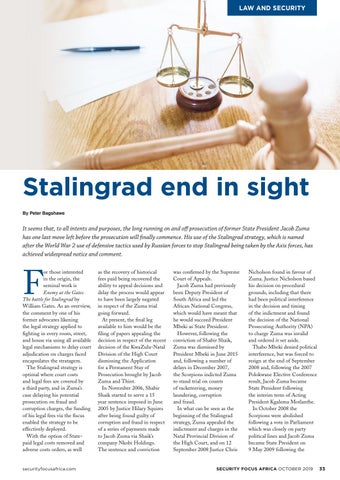LAW LAWAND & SECURITY SECURITY
By Peter Bagshawe
headline intro
Stalingrad end in sight By Peter Bagshawe
It seems that, to all intents and purposes, the long running on and off prosecution of former State President Jacob Zuma has one last move left before the prosecution will finally commence. His use of the Stalingrad strategy, which is named after the World War 2 use of defensive tactics used by Russian forces to stop Stalingrad being taken by the Axis forces, has achieved widespread notice and comment.
F
or those interested in the origin, the seminal work is Enemy at the Gates: The battle for Stalingrad by William Gates. As an overview, the comment by one of his former advocates likening the legal strategy applied to fighting in every room, street, and house via using all available legal mechanisms to delay court adjudication on charges faced encapsulates the stratagem. The Stalingrad strategy is optimal where court costs and legal fees are covered by a third party, and in Zuma’s case delaying his potential prosecution on fraud and corruption charges, the funding of his legal fees via the fiscus enabled the strategy to be effectively deployed. With the option of Statepaid legal costs removed and adverse costs orders, as well
securityfocusafrica.com
as the recovery of historical fees paid being recovered the ability to appeal decisions and delay the process would appear to have been largely negated in respect of the Zuma trial going forward. At present, the final leg available to him would be the filing of papers appealing the decision in respect of the recent decision of the KwaZulu-Natal Division of the High Court dismissing the Application for a Permanent Stay of Prosecution brought by Jacob Zuma and Thint. In November 2006, Shabir Shaik started to serve a 15 year sentence imposed in June 2005 by Justice Hilary Squires after being found guilty of corruption and fraud in respect of a series of payments made to Jacob Zuma via Shaik’s company Nkobi Holdings. The sentence and conviction
was confirmed by the Supreme Court of Appeals. Jacob Zuma had previously been Deputy President of South Africa and led the African National Congress, which would have meant that he would succeed President Mbeki as State President. However, following the conviction of Shabir Shaik, Zuma was dismissed by President Mbeki in June 2015 and, following a number of delays in December 2007, the Scorpions indicted Zuma to stand trial on counts of racketeering, money laundering, corruption and fraud. In what can be seen as the beginning of the Stalingrad strategy, Zuma appealed the indictment and charges in the Natal Provincial Division of the High Court, and on 12 September 2008 Justice Chris
Nicholson found in favour of Zuma. Justice Nicholson based his decision on procedural grounds, including that there had been political interference in the decision and timing of the indictment and found the decision of the National Prosecuting Authority (NPA) to charge Zuma was invalid and ordered it set aside. Thabo Mbeki denied political interference, but was forced to resign at the end of September 2008 and, following the 2007 Polokwane Elective Conference result, Jacob Zuma became State President following the interim term of Acting President Kgalema Motlanthe. In October 2008 the Scorpions were abolished following a vote in Parliament which was closely on party political lines and Jacob Zuma became State President on 9 May 2009 following the
SECURITY FOCUS AFRICA OCTOBER 2019
33






















